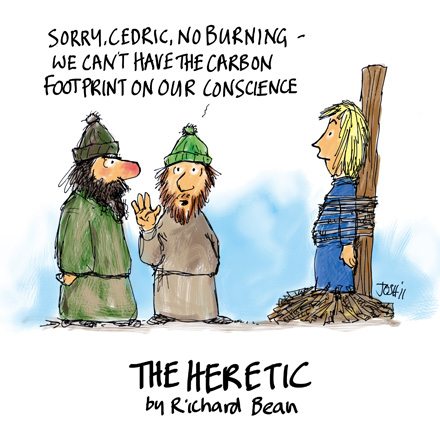This is a guest post, courtesy of Josh and Mrs Josh.

The Heretic by Richard Bean
Royal Court Theatre, London
Book your tickets now, this play is a must-see comedy.
It has everything - more accurate climate science than a BBC documentary (ok, that's not exactly hard), brilliantly funny and wonderfully staged.
The drama centres on university climate scientist, Dr Diane Cassell, played superbly by Juliet Stevenson, whose research on sea levels in the Maldives shows no rising trend in sea levels.
This puts her at odds with Professor Kevin Maloney, Head of Dept Earth Sciences, played by James Fleet (sinisterly morphed from Hugo, in the Vicar of Dibley) whose main aim is to attract more funding to the department by toeing the consensus line on Climate Change.
When she publishes her research and expresses her skeptical views, notably on Newsnight to Jeremy Paxman, she becomes the focus of some very direct persecution.
Add in Phoebe, her daughter, and Ben, her carbon-obsessed first-year student, plus an ex-marine security guard and the stage is set. Pure comedy ensues as Ben follows the logic of his beliefs, refusing to keep warm, travel in any petroleum-based transport, and considering suicide since his vegetarian diet causes excessive methane production. Phoebe is ahead of him; severely anorexic she is at real risk of not making it. Both characters are played with worrying fragility that conveys lives overshadowed by fear, battling to understand the issues or find a set of rules to live by. Their plight is all too similar to that of Diane, struggling to work out if the death threats from environmentalists should be taken seriously.
In a feat of Montfordian proportions nearly all the major recent climate change stories are woven into the play: the lack of sea level rise, the politicisation of science by the IPCC, Glaciergate, the logarithmic effect of CO2 (in a way you will never forget), the misanthropy of some environmentalist groups, the 'one-tree' hockey stick, and, of course, Climategate. But the issues are put on the table, without arm twisting, encouraging the audience to go out and do their own research.
What is central to the play is the importance of empirical science. The drama of the play reveals that it is a matter of maturity and character to find and stick with what is true. It is the best efforts of those attempting to live in extreme versions of the truth, whether innocently or knowingly, that creates both the comic tension and the dramatic tragedy of the play. All the characters are treated with sympathy as they hobble and trip over their own foibles, and the audience spends the moments between scene changes sitting in the dark while conflicting radio information bombards the ears. We sympathise with the characters because we are all struggling with the same problem of sifting truth from information, all the while wondering just how serious a predicament we are in.
The author Richard Bean has crafted a modern day comedy of manners - with some climate science - that asks the question how should we live our lives? He refuses to offer us pat answers – this is after all a play about taking responsibility for what we know and believe - but he does give us hope, both for the planet and for humanity.
It is a play that, at its heart, likes people and in this age of post-modern, post-normal, post-everything, that is something worth treasuring.
And now I know. I'm a heretic and proud of it.